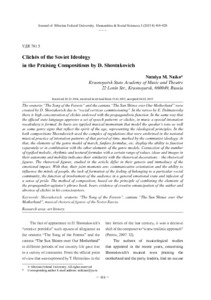Clichés of the Soviet Ideology in the Praising Compositions by D. Shostakovich
Скачать файл:
URI (для ссылок/цитирований):
https://elib.sfu-kras.ru/handle/2311/16728Автор:
Naiko, Natalya M.
Найко, Н.М.
Дата:
2015-03Аннотация:
The oratorio “The Song of the Forests” and the cantata “The Sun Shines over Our Motherland” were
created by D. Shostakovich due to “social services commissioning”. In the verses by E. Dolmatovsky
there is high concentration of clichés endowed with the propagandistic function. In the same way that
the official state language approves a set of speech patterns or clichés, in music a special intonation
vocabulary is formed. Its basis are typified musical momentum that model the speaker’s tone as well
as some genre signs that reflect the spirit of the age, representing the ideological principles. In the
both compositions Shostakovich used the complex of regulations that were enshrined in the national
musical practice of intonation patterns of that period of time, marked by the communist ideology. At
that, the elements of the genre model of march, fanfare formulas, etc. display the ability to function
separately or in combination with the other elements of the genre models. Connection of the number
of typified melodic, rhythmic and textural formulas with a certain range of values, ideas and images in
their autonomy and mobility indicates their similarity with the rhetorical decorations – the rhetorical
figures. The rhetorical figures, studied in the article differ in their genesis and immediacy of the
emotional impact. With that, their joint moments are: communicative orientation and the ability to
influence the minds of people, the task of formation of the feeling of belonging to a particular social
community, the function of involvement of the audience in a general emotional state and infusion of
a sense of pride. The method of composition, based on the principle of combining the elements of
the propagandist-agitator’s phrase book, bears evidence of creative emancipation of the author and
absence of clichés in his consciousness Создание Д. Шостаковичем оратории «Песнь о лесах» и кантаты «Над Родиной нашей
солнце сияет» было данью «соцзаказу». В стихах Е. Долматовского высока концентрация
трафаретных оборотов, наделенных пропагандистской функцией. Подобно тому как в
официальном государственном языке утверждается набор шаблонных выражений, языковых
клише, в сфере музыкального языка формируется особый интонационный словарь. Базой
для него становятся типизированные музыкальные обороты, моделирующие ораторскую
интонацию, и некоторые жанровые знаки, отражающие дух эпохи, репрезентирующие
идеологические установки. Шостакович в обоих произведениях использует комплекс
нормативных, закрепленных в отечественной музыкальной практике того времени
интонационных моделей, отмеченных печатью коммунистического мировоззрения. При
этом элементы жанровой модели марша, фанфарные формулы и т.д. обнаруживают
способность функционировать обособленно либо сочетаясь с элементами иных жанровых
моделей. Связь ряда типизированных мелодических, ритмических, фактурных формул с
определённым кругом значений, идей, образов при их автономности и мобильности указывает
на их подобие риторическим decoration – тропам. Рассмотренные в статье риторические
фигуры различаются по своему генезису и непосредственности эмоционального воздействия.
Вместе с тем их общими моментами остаются: коммуникативная направленность и
возможность влиять на сознание людей; задача формирования у массы людей ощущения своей
принадлежности к определенной социальной общности; функция вовлечения слушателей в
некоторое общее эмоциональное состояние, внушения чувства гордости. Метод композиции,
основанный на принципе комбинирования элементов из фразеологического словаря
пропагандиста-агитатора, свидетельствует о творческой раскрепощенности автора,
незаштампованности его сознания

